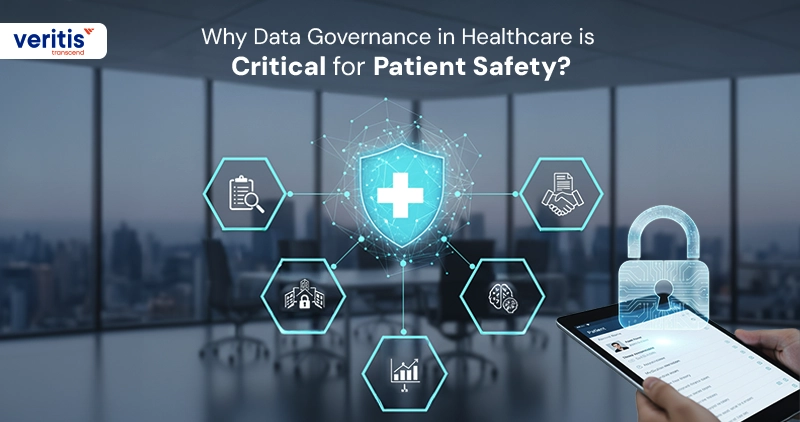
Every second, healthcare systems generate more data than ever imagined, clinical notes, imaging results, wearable sensors, genomics, and patient records flowing across dozens of platforms. Yet the question that defines modern healthcare leadership is not how much data we have, but how much of it we can trust. That’s the essence of data governance in healthcare, turning information chaos into coordinated intelligence that protects patients and drives precision care.
When patient safety depends on a single record, an incorrect data field is not a clerical error; it’s a risk event. CIOs, CTOs, and Chief Data Officers recognize that practical data governance tools and a unified data governance platform have become essential investments, critical to ensuring data integrity, compliance, and patient trust.
As healthcare organizations accelerate digital transformation, they face rising data governance challenges: fragmented systems, inconsistent standards, and ever tightening regulations. In this environment, a well structured data governance strategy defines not how data is managed, but how lives are protected. It connects the dots between technology, trust, and transparency, ensuring that every data point guiding a diagnosis is verified, secure, and aligned with ethical standards.
This is where leadership vision meets execution. Through modern data governance solutions and expert led data governance implementation, forward thinking healthcare enterprises are building patient centric ecosystems where accuracy equals safety. In the sections ahead, we’ll explore how a robust data governance process delivers measurable outcomes, why data governance in healthcare is the foundation of clinical integrity, and how strategic alignment among people, processes, and platforms defines the next era of patient care.
Schedule a Data Governance Assessment
What is Data Governance in Healthcare?
Data governance in healthcare is the foundation that ensures data accuracy, security, and accountability across every clinical and administrative system. It defines how organizations manage, access, and protect sensitive information, including patient records and lab results, as well as billing and insurance data. A strong data governance strategy establishes clear ownership, standardized procedures, and transparent workflows that support clinical decisions and regulatory compliance.
At its core, healthcare data governance combines people, processes, and technology to create an integrated framework for managing information throughout its lifecycle. This includes defining roles for each data governance analyst, setting data quality benchmarks, and implementing reliable data governance tools and a centralized data governance platform to maintain consistency across systems.
The data governance benefits extend far beyond compliance. By enabling trustworthy, real time insights, healthcare leaders can improve patient outcomes, strengthen operational efficiency, and make data driven decisions with confidence. For organizations pursuing enterprise data governance, this approach aligns every department, from IT and security to clinical operations, around a single version of truth.
In practice, effective data governance for healthcare supports both patient data governance and patient centered data governance, ensuring that information guiding treatment is accurate, timely, and ethically used. It also addresses regulatory compliance in healthcare, protecting both the institution’s reputation and patient safety. In a world where data defines care quality, strong data governance implementation is not optional; it’s a strategic necessity for every healthcare organization.
Why is Data Governance Important in Healthcare?
In healthcare, every decision depends on the accuracy and reliability of data. Data governance in healthcare ensures that patient information is consistent, secure, and compliant with regulations. It helps organizations eliminate data silos, reduce medical errors, and strengthen patient trust.
By implementing a robust data governance strategy, healthcare providers can leverage verified data to improve clinical outcomes, streamline operations, and maintain regulatory compliance. With the right data governance tools and data governance platform, leaders can turn raw information into actionable intelligence, making care safer, faster, and more transparent.
In short, effective healthcare data governance connects technology, ethics, and accountability to protect patients and enable more intelligent decision making across the enterprise.
Useful Link: What is Data Governance?
What Are the Key Components of Healthcare Data Governance?
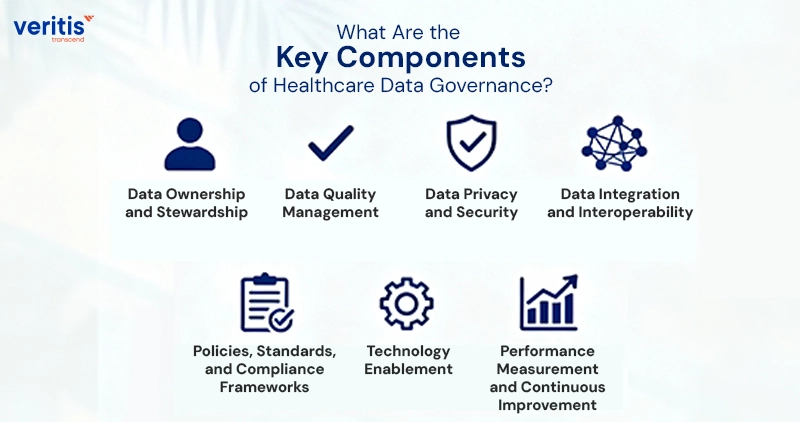
A successful data governance in healthcare framework is built on structure, accountability, and continuous oversight. It defines how healthcare organizations manage data throughout its lifecycle, from creation to consumption, ensuring accuracy, security, and compliance at every step.
Here are the Key components that define a strong healthcare data governance model:
1) Data Ownership and Stewardship
Clear ownership ensures accountability for every data element within the organization.
- Data owners define who can access and modify specific data assets.
- Data stewards monitor quality, ensure accuracy, and maintain compliance with privacy regulations.
This governance model establishes responsibility at every level, supporting patient data governance and compliance consistency.
2) Data Quality Management
Reliable decisions depend on high quality data. Practical data governance tools continuously monitor and correct inconsistencies, duplicates, or missing records.
- Validates accuracy across clinical systems.
- Standardizes formats for interoperability.
- Enables consistent reporting across facilities.
The result: fewer clinical errors and greater trust in analytics driven care.
3) Data Privacy and Security
Protecting sensitive patient information is central to data governance in healthcare. A strong security framework ensures compliance with HIPAA, GDPR, and other healthcare regulatory mandates.
- Role based access controls
- Encryption and anonymization techniques
- Continuous monitoring for unauthorized access
This component is vital for maintaining patient trust and ethical data use.
4) Data Integration and Interoperability
Fragmented data systems are among the biggest data governance challenges in healthcare. Integration bridges EHRs, diagnostic platforms, and insurance systems through a unified data governance platform.
- Promotes a single source of truth
- Enables faster and more accurate care coordination
- Reduces redundant data entry and operational inefficiency
Strong integration also supports enterprise data governance, aligning departments and workflows across the organization.
5) Policies, Standards, and Compliance Frameworks
A formal data governance process requires defined policies and compliance standards. These frameworks ensure consistency across regions, teams, and technologies.
- Defines how data is collected, classified, and shared
- Ensures compliance with privacy and reporting standards
- Guides how new technologies are adopted within the governance ecosystem
This policy driven structure enables long term scalability and sustainable governance.
6) Technology Enablement
Modern data governance solutions rely on technology to automate governance workflows, monitor data quality, and manage access.
- AI powered validation and anomaly detection
- Cloud based data governance platforms for real time visibility
- Automated lineage tracking to identify data origins and changes
With the proper data governance implementation, these technologies drive efficiency, accuracy, and continuous improvement.
7) Performance Measurement and Continuous Improvement
To sustain long term success, healthcare organizations must measure the data governance benefits and refine their strategies regularly.
- Establish KPIs around accuracy, timeliness, and compliance
- Review incidents, access logs, and data quality reports
- Engage a data governance consultant or data governance analyst to identify improvement areas
Continuous evaluation turns governance from a compliance activity into a strategic asset that strengthens healthcare data management and supports patient centered data governance.
The key components of healthcare data governance, ownership, quality, security, interoperability, policies, technology, and measurement form a complete ecosystem that safeguards patient data and enhances trust. Together, they convert data from a liability into an enterprise advantage, ensuring healthcare leaders deliver safer, smarter, and more compliant care.
Useful Link: Why is Identity Governance and Administration Essential for Enterprise Risk Management?
The Benefits of Data Governance in Healthcare
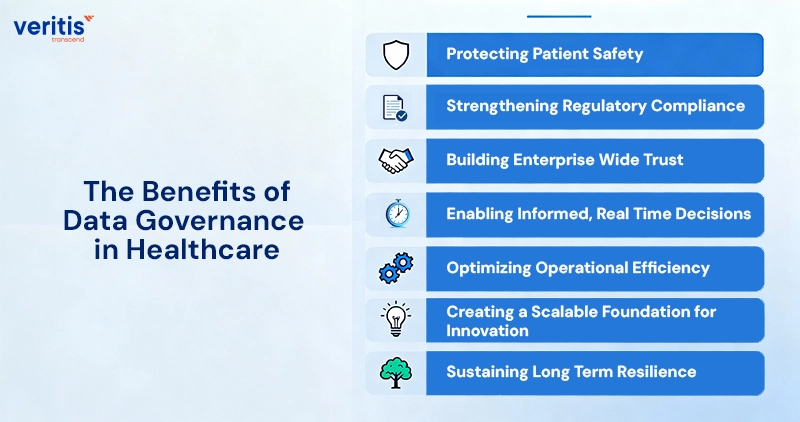
In healthcare, every decision is only as good as the data behind it. A well designed data governance strategy not only organizes information but also strengthens clinical reliability, compliance, and trust. Below are the key data governance benefits in healthcare, viewed through the perspective of patient safety and enterprise value.
1) Protecting Patient Safety
Data accuracy is a clinical imperative.
- Reduces diagnostic errors caused by incomplete or inconsistent data.
- Improves care coordination by providing one verified view of each patient.
- Supports patient centered data governance, ensuring that sensitive details are used ethically and securely.
When every care decision relies on verified data, healthcare data governance becomes a direct safeguard for human life.
2) Strengthening Regulatory Compliance
Regulations such as HIPAA, GDPR, and HITRUST require complete control over how information is stored, shared, and protected.
- Automated compliance monitoring through advanced data governance tools.
- Audit ready documentation aligned with privacy mandates.
- Consistent policies across departments and systems.
Effective data governance implementation reduces compliance risk, financial penalties, and reputational damage, ensuring lasting regulatory compliance in healthcare.
3) Building Enterprise Wide Trust
Trust is the currency of modern healthcare.
- Establishes accountability through clear data ownership and stewardship.
- Promotes transparency across IT, clinical, and administrative teams.
- Reinforces a unified culture of data ethics and reliability.
Through enterprise data governance, organizations replace fragmented systems with a shared foundation of truth, which serves as the basis for credible decisions and collaborative innovation.
4) Enabling Informed, Real Time Decisions
With a unified data governance platform, leaders gain accurate, analytics ready data.
- Enhances predictive analytics and AI modeling.
- Supports faster clinical and financial decision making.
- Improves accuracy in population health, supply chain, and operations.
The actual data governance benefits emerge when trusted data accelerates every executive decision, rather than focusing on compliance reports.
5) Optimizing Operational Efficiency
Siloed systems slow care and inflate costs.
- Integrates EHR, billing, and lab systems under one governed framework.
- Automates workflows to eliminate redundancy and rework.
- Drives measurable ROI through reduced errors and lower operational waste.
Innovative data governance solutions turn information flow into an efficiency engine across the entire organization.
6) Creating a Scalable Foundation for Innovation
Future ready healthcare depends on governed, high quality data.
- Enables responsible AI, predictive analytics, and automation.
- Supports interoperability for digital health ecosystems.
- Accelerates innovation without compromising compliance.
With the right data governance services and expert guidance from a data governance consultant, innovation becomes structured, ethical, and secure.
7) Sustaining Long Term Resilience
Governance is not a project; it’s a discipline.
- Continuous measurement of data quality and access integrity.
- Regular policy updates to meet evolving standards.
- Dedicated data governance analyst oversight for proactive improvement.
Resilient healthcare organizations treat data governance for healthcare as an ongoing investment in credibility, continuity, and care quality.
The benefits of data governance in healthcare extend beyond compliance; they define the trust that powers patient safety and executive confidence. By investing in modern data governance tools, implementing a robust data governance platform, and embedding governance into every process, healthcare leaders turn information integrity into clinical excellence.
Partner with Veritis for Enterprise Digital Strategy
Useful Link: What is Data Warehouse Architecture? Layers, Components, and Best Practices
Creating a Sustainable Data Governance Model in Healthcare
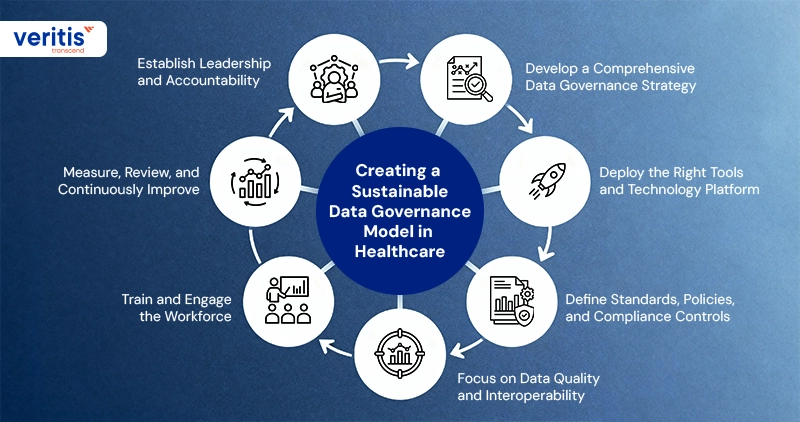
Implementing data governance in healthcare is not just a technology project; it’s an enterprise wide transformation. Success depends on aligning people, processes, and platforms around a shared vision of data integrity and patient safety. Below are the essential capabilities every healthcare organization must develop to achieve a strong, sustainable data governance implementation.
1) Establish Leadership and Accountability
Governance begins with ownership.
- Appoint an executive sponsor such as the CDO, CIO, or CTO to champion governance across departments.
- Define clear roles for data governance analysts, data stewards, and compliance officers.
- Create a steering committee responsible for policy enforcement and escalation paths.
This leadership structure ensures enterprise data governance is driven from the top and sustained across every operational layer.
2) Develop a Comprehensive Data Governance Strategy
A solid data governance strategy defines how data is collected, stored, accessed, and protected.
- Identify mission critical data assets, including EHRs, patient registries, and claims systems.
- Map existing workflows and ownership structures.
- Define metrics for data quality, security, and compliance performance.
Working with an experienced data governance consultant helps ensure alignment between strategic objectives and technical execution.
3) Deploy the Right Tools and Technology Platform
Modern healthcare requires technology that simplifies oversight and ensures transparency.
- Implement data governance tools that automate validation, lineage tracking, and access management.
- Use a unified data governance platform to integrate multiple systems and deliver a single, governed data source.
- Adopt AI driven quality monitoring for faster anomaly detection and corrective action.
This digital foundation supports accuracy, interoperability, and ongoing compliance across complex ecosystems.
4) Define Standards, Policies, and Compliance Controls
Policies form the backbone of the data governance process.
- Establish data classification rules for personal, clinical, and operational data.
- Document access privileges, retention periods, and audit protocols.
- Align standards with regulatory compliance in healthcare frameworks such as HIPAA, GDPR, and HITRUST.
A policy first model ensures that data is managed ethically and consistently across all applications and regions.
5) Focus on Data Quality and Interoperability
Clean data saves lives.
- Apply continuous data quality checks to reduce duplicates, errors, and incomplete fields.
- Enable interoperability between clinical, billing, and analytics systems.
- Standardize terminologies (HL7, FHIR, ICD) for cross platform accuracy.
These steps directly enhance healthcare data management, making it easier to share insights securely and efficiently across the care continuum.
6) Train and Engage the Workforce
Technology succeeds only when people embrace it.
- Conduct regular governance and compliance training sessions.
- Educate clinicians and staff on proper data entry, sharing, and protection protocols.
- Build awareness around the data governance benefits and their link to patient safety.
An informed workforce turns governance principles into everyday habits, fostering a culture of responsibility and accuracy.
7) Measure, Review, and Continuously Improve
Data governance is an ongoing discipline.
- Track performance metrics such as error reduction, compliance rates, and data availability.
- Conduct regular maturity assessments to identify improvement opportunities.
- Collaborate with data governance services providers for audits and enhancements.
Continuous refinement ensures data governance solutions evolve with emerging technologies, threats, and regulatory demands.
Building a practical data governance framework in healthcare requires more than tools; it demands strategy, accountability, and cultural adoption. With exemplary leadership, technology, and a continuous improvement mindset, healthcare organizations can transform data governance into a long term driver of patient safety, operational excellence, and enterprise trust.
Useful Link: How Can Data Analytics in Healthcare Help C-Suite Executives Reduce Costs and Improve Outcomes?
Key Challenges in Data Governance for Healthcare
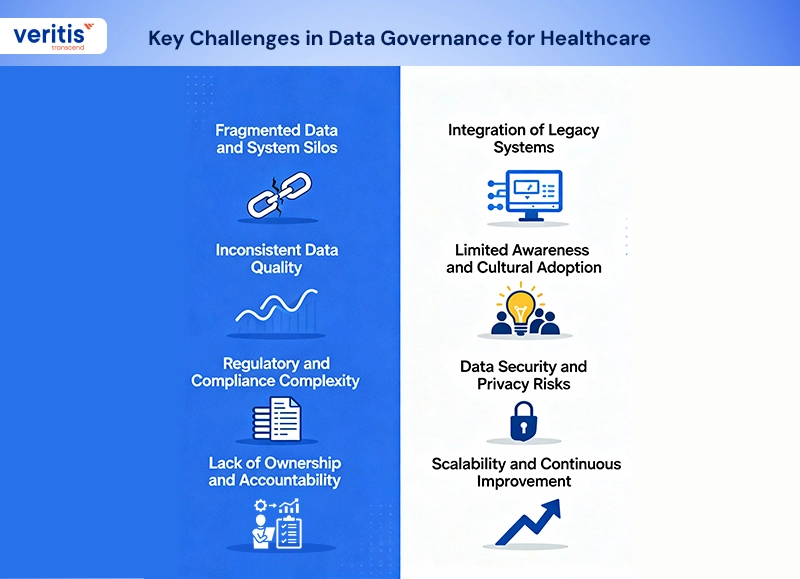
Implementing data governance in healthcare presents both opportunities and complexities. Hospitals, payers, and life sciences organizations must manage massive volumes of sensitive data while maintaining security, quality, and compliance. Below are the significant challenges healthcare leaders face in establishing effective data governance frameworks, along with how Veritis helps resolve each challenge through proven expertise and tailored data governance solutions.
1) Fragmented Data and System Silos
The Challenge:
Healthcare organizations often operate across multiple EHRs, billing systems, and third party applications. This fragmentation leads to inconsistent records, duplicated data, and limited visibility across departments.
Veritis Solution:
Veritis implements an integrated data governance platform that unifies data across all systems, creating a single source of truth. Our data governance tools ensure accuracy, eliminate redundancy, and streamline access across the entire enterprise.
2) Inconsistent Data Quality
The Challenge:
Poor data quality undermines clinical decisions and analytics. Missing fields, mismatched formats, and inaccurate entries compromise both patient safety and operational reporting.
Veritis Solution:
Veritis’ data governance services automate data validation, cleansing, and standardization. We use AI driven quality controls within a centralized healthcare data management framework to ensure reliable, real time data for patient care and compliance.
3) Regulatory and Compliance Complexity
The Challenge:
Healthcare leaders must comply with evolving standards such as HIPAA, GDPR, and HITRUST. Managing compliance across multiple jurisdictions is one of the biggest data governance challenges in the industry.
Veritis Solution:
Our data governance strategy embeds compliance into every layer of governance, access, storage, sharing, and retention. Veritis creates auditable, policy driven governance models that ensure full regulatory compliance in healthcare while reducing administrative overhead.
4) Lack of Ownership and Accountability
The Challenge:
Without defined data ownership, accountability gaps arise. Departments often treat governance as an IT responsibility, not an enterprise broad discipline.
Veritis Solution:
Veritis establishes clear governance roles, from data governance analysts to data stewards and executive sponsors. Our enterprise data governance model aligns responsibilities, ensuring every dataset has a designated owner accountable for its integrity and lifecycle.
5) Integration of Legacy Systems
The Challenge:
Outdated IT infrastructures make it challenging to integrate modern data governance solutions. Many legacy systems lack APIs or governance controls, leading to blind spots in oversight.
Veritis Solution:
Veritis modernizes legacy environments with hybrid data governance implementation models. We enable seamless integration between legacy and cloud platforms, improving data transparency without disrupting existing operations.
6) Limited Awareness and Cultural Adoption
The Challenge:
Even the best tools fail without organizational buy in. Many teams lack awareness of governance’s role in patient safety and strategic decision making.
Veritis Solution:
Veritis conducts governance maturity assessments and targeted training programs to promote adoption. We help create a culture that understands the data governance benefits and ties governance excellence directly to clinical and business outcomes.
7) Data Security and Privacy Risks
The Challenge:
The rise in cyberattacks and data breaches has made patient data governance and privacy protection more critical than ever. Unsecured data flows across systems expose organizations to regulatory and reputational risks.
Veritis Solution:
Veritis implements multi layered data governance tools with encryption, access controls, and real time monitoring. Our frameworks are designed for patient centered data governance, ensuring every access and use of patient data is secure, compliant, and ethical.
8) Scalability and Continuous Improvement
The Challenge:
Governance frameworks often stall after initial rollout due to a lack of scalability or defined performance metrics.
Veritis Solution:
Veritis helps healthcare enterprises scale governance through continuous optimization. We provide periodic reviews, metric based performance tracking, and strategic consulting to evolve governance maturity in line with business growth and technology change.
The journey toward effective data governance in healthcare involves overcoming systemic, cultural, and technical barriers. Veritis brings together proven data governance solutions, deep domain expertise, and enterprise grade technology to help healthcare organizations establish lasting control, trust, and value from their data.
With a clear data governance strategy, structured data governance process, and continuous support from Veritis experts, healthcare leaders can turn governance from a compliance task into a cornerstone of patient safety and operational excellence.
Useful Link: What Makes a Data Driven Culture Essential for Modern C-Suite Leaders?
Using Tools and Technologies for Healthcare Data Governance
Technology is the backbone of modern data governance in healthcare. The right tools help organizations manage information efficiently, improve compliance, and ensure that clinical and operational data remain accurate, secure, and accessible.
Below are the essential tools and technologies that drive effective healthcare data governance.
1) Centralized Data Governance Platforms
A unified data governance platform acts as the command center for managing data policies, standards, and access controls.
- Brings together all governance activities in one interface.
- Enables collaboration between IT, compliance, and clinical teams.
- Supports version control, audit tracking, and lifecycle management.
These platforms simplify data governance implementation and help ensure that every dataset is managed according to defined policies.
2) Data Quality Management Tools
Quality determines trust. Data governance tools focused on quality continuously check for errors, duplicates, and inconsistencies.
- Automate validation and correction.
- Standardize formats across multiple healthcare systems.
- Ensure data is accurate and complete for clinical and operational use.
High quality data supports patient safety and explores the full data governance benefits.
3) Metadata and Cataloging Solutions
Metadata management tools organize data assets and track how information flows through systems.
- Provide visibility into data origins, ownership, and transformations.
- Help data governance analysts understand relationships between systems.
- Enable faster search, classification, and policy enforcement.
These tools are critical to maintaining transparency in enterprise data governance frameworks.
4) Security and Compliance Technologies
Protecting patient information is central to patient data governance and regulatory compliance in healthcare.
- Role based access controls limit who can view or modify sensitive data.
- Encryption and tokenization secure data in transit and at rest.
- Continuous monitoring detects unauthorized access or policy violations.
These technologies reinforce patient centered data governance, building trust between patients, providers, and regulators.
5) Data Integration and Interoperability Tools
Healthcare data often resides in different systems, such as EHRs, billing software, and diagnostic platforms. Integration tools connect these systems securely.
- Create unified views of patient data across departments.
- Enable smooth data exchange using standards like HL7 and FHIR.
- Reduce duplication and manual reconciliation.
Effective integration supports healthcare data management and enhances decision making.
6) Analytics and Monitoring Dashboards
Governance success depends on visibility.
- Dashboards provide real time insights into data quality, compliance, and usage.
- Enable leaders to track the benefits of data governance through measurable KPIs.
- Help organizations identify gaps and optimize governance over time.
With continuous monitoring, data governance services can evolve alongside organizational needs and regulations.
Conclusion
The future of healthcare will be defined not only by medical innovation but by the integrity of the data that powers it. With the growing volume of digital data produced by hospitals, insurers, and life sciences companies, ensuring that this information is accurate, secure, and properly governed has become more critical than ever. Effective data governance in healthcare transforms this data from a compliance obligation into a strategic advantage, protecting patients, enhancing decision making, and driving enterprise wide excellence.
Every section of the governance framework, policy, process, platform, and people plays a vital role in ensuring that care decisions are made with confidence. With the right data governance tools, a robust data governance platform, and a forward looking data governance strategy, healthcare organizations can build the trust and transparency required to improve clinical outcomes and ensure long term sustainability.
This is where Veritis stands apart. For more than two decades, Veritis has been a trusted partner to leading healthcare enterprises, delivering tailored data governance services that combine deep domain expertise with advanced technology. From designing comprehensive data governance frameworks to guiding full scale data governance implementation, Veritis helps organizations achieve measurable gains in compliance, efficiency, and patient safety.
Our team of experts, including experienced data governance consultants and data governance analysts, works closely with healthcare leaders to establish scalable governance programs that align with regulatory standards and business priorities. We bring clarity to complexity, converting fragmented data into governed intelligence that supports every clinical and operational decision.
For healthcare executives ready to transform governance into growth, Veritis offers more than solutions; it offers partnership, precision, and proven success.